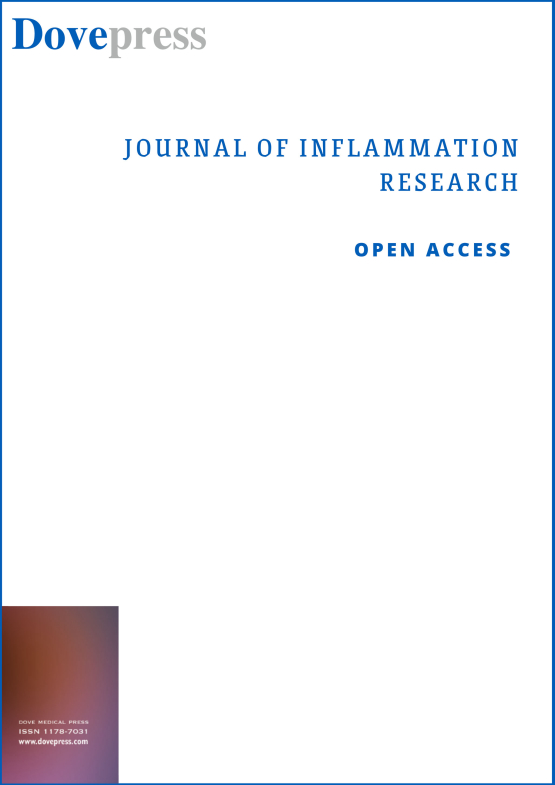Submit a Manuscript to the Journal
Journal of Inflammation Research
For an Article Collection on
Inflammatory Disorders and Diseases of Environmental Etiology
Manuscript deadline


Article collection guest advisor(s)
Dr. Afzaal N. Mohammed,
University of Arizona COM-Phoenix
Prof. Dr. Jagjit S. Yadav,
University of Cincinnati College of Medicine
Inflammatory Disorders and Diseases of Environmental Etiology
The Journal of Inflammation Research, together with Guest Advisors Dr. Afzaal N. Mohammed and Prof. Dr. Jagjit S. Yadav, is pleased to welcome you to submit your research to the upcoming Article Collection “Inflammatory Disorders and Diseases of Environmental Etiology”.
Chronic Inflammation is a key pathological feature underlying development and progression of chronic diseases including cardiovascular, respiratory, and neurodegenerative disorders. Inflammation is triggered by various environmental insults such as long-term exposure to toxic particles (PM2.5, ultrafines or nanoparticles), industrial chemicals (immunotoxicants), biological agents and infections, and climate change. On the other hand, occupational exposures to toxic particles or fibers, industrial and agricultural chemicals are among the major factors associated with chronic inflammatory disorders in adults. Certain communities living in the areas with inadequate zonal policies or working in settings with higher and prolonged exposure to such pollutants, are at a greater risk of developing chronic inflammatory disorders. Additionally, children born in or living in such areas have arrested growth and higher rate of developmental disorders.
Published studies have consistently reported that exposed individuals may suffer chronic inflammation in different organs due to differential modulation of innate or adaptive pathways locally or systematically leading to development or exacerbation of inflammatory and/or developmental disorders. Chronic inflammatory and developmental disorders with environmental origins are poorly characterized in terms of their etiology, underlying mechanisms, potential therapeutic targets and targeted therapies due to unique pathological manifestations in these disorders.
Environmental etiology of chronic inflammatory and developmental disorders is an important public health concern that needs to be addressed. Vulnerable communities often suffer from greater exposure risks and limited healthcare access leading to underdiagnosis of inflammatory and developmental disorders. Advancements in public health and mechanistic research to address these issues may unravel the causative factor(s), pathological mechanisms, and exposure limits of the key environmental factors responsible for disease burden. Additionally, such research advancements could help unravel potential therapeutic targets and facilitate development of targeted therapies for environmentally induced chronic disorders. Research in these directions will promote the health equity and minimize the disease burden.
We welcome all original research articles and comprehensive reviews focusing on, but not limited to, the following:
Original Research articles: Original articles may be focused on either mechanistic or epidemiological studies addressing the chronic inflammatory and developmental disorders associated with exposure to pollutants including particulates (natural or engineered) or chemical agents (metals, PFAS, pesticides, etc.), infectious agents or their antigens, climate change, or other environmental factors. Experimental studies using cellular or animal models should define the resemblance of the models with the real-world exposure scenario in human population. Animal studies could be focused on addressing the toxicological aspects, identifying molecular targets, biomarkers of exposure or effect, and/or targeted therapies, and proposing potential intervention/mitigation strategies. Epidemiological studies could focus on identifying the populations at risk of chronic inflammatory or developmental disorders and the associated environmental exposures and risk factors. Besides focusing on the current levels of exposure in the populations at risk, epidemiological studies may also focus on developing/recommending the permissible limits of these toxicants in residential and occupational settings.
Comprehensive Review Articles: Review articles addressing the pathologies of chronic inflammatory or developmental disorders of environmental origin using experimental models could incorporate source of release of toxicant in the environment, exposure routes, biological effects and organ toxicities, mechanistic aspects, and therapeutic targets. Reviews based on human epidemiological studies may focus on consideration of the zonal policies, vulnerable populations, current problem of unequal disease burden due to toxicants, environmental regulation of the toxicants, and biomonitoring data addressing the level of exposure to humans and the environment. Comprehensive reviews may take into account both experimental and human studies. It is strongly recommended to propose potential strategies to improve the public health and promote health equity.
Please submit your manuscript on our website, using the promo code 874E2 to indicate that the manuscript is intended for the “Inflammatory Disorders and Diseases of Environmental Etiology” Collection. The deadline for submitting a manuscript is 11 March 2026.
Please contact Ashley Ambros at Ashley.ambros@taylorandfrancis.com with any queries and discount codes regarding this Article Collection.
Keywords: Pollutants; immunotoxicity disorders; environmental exposures; transgenerational immune effects
Benefits of publishing open access within Taylor & Francis
Global marketing and publicity, ensuring your research reaches the people you want it to.
Article Collections bring together the latest research on hot topics from influential researchers across the globe.
Rigorous peer review for every open access article.
Rapid online publication allowing you to share your work quickly.
Submission Instructions
All manuscripts submitted to this Article Collection will undergo desk assessment and peer-review as part of our standard editorial process. Guest Advisors for this collection will not be involved in peer-reviewing manuscripts unless they are an existing member of the Editorial Board. Please review the journal Aims and Scope and author submission instructions prior to submitting a manuscript.
